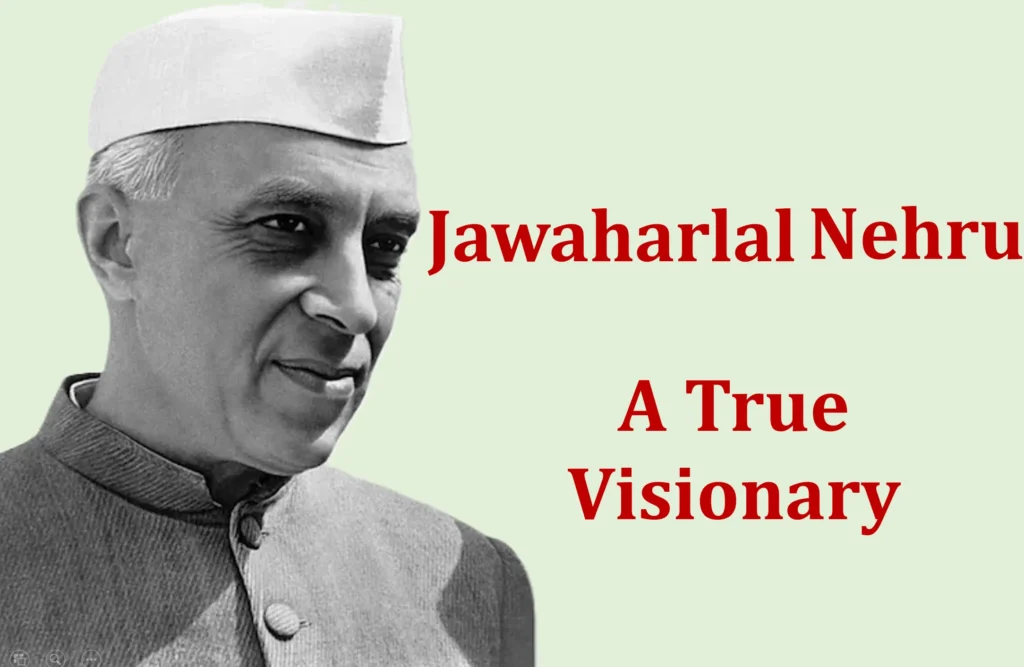
Jawaharlal Nehru: An Introduction
Jawaharlal Nehru, a figure, in history played a role in shaping the India we are familiar, with today. Renowned for his leadership and unwavering dedication to the nation his contributions are widely celebrated. This article will examine how his vision affected a nation’s fate by delving into his origins, political career, and influential ideals.
Jawaharlal Nehru’s Background and Early Life
Born on November 14, 1889 in Allahabad, India Jawaharlal Nehru hailed from a family. His father, Motilal Nehru was a lawyer who passionately advocated for independence. Nehru himself received his education, in England where he was exposed to cultures and ideas that profoundly influenced his beliefs.
Support of Kamala Nehru
Jawaharlal Nehru’s family life was marked by both personal and political dimensions, with the support of his wife, Kamala Nehru, playing a crucial role in his endeavors.
Marriage and Family Dynamics
Jawaharlal Nehru married Kamala Kaul in 1916. Kamala came from a conservative background, and their marriage marked a union of different cultural and social influences. The couple had one daughter, Indira Priyadarshini, who would later become the first female Prime Minister of India.
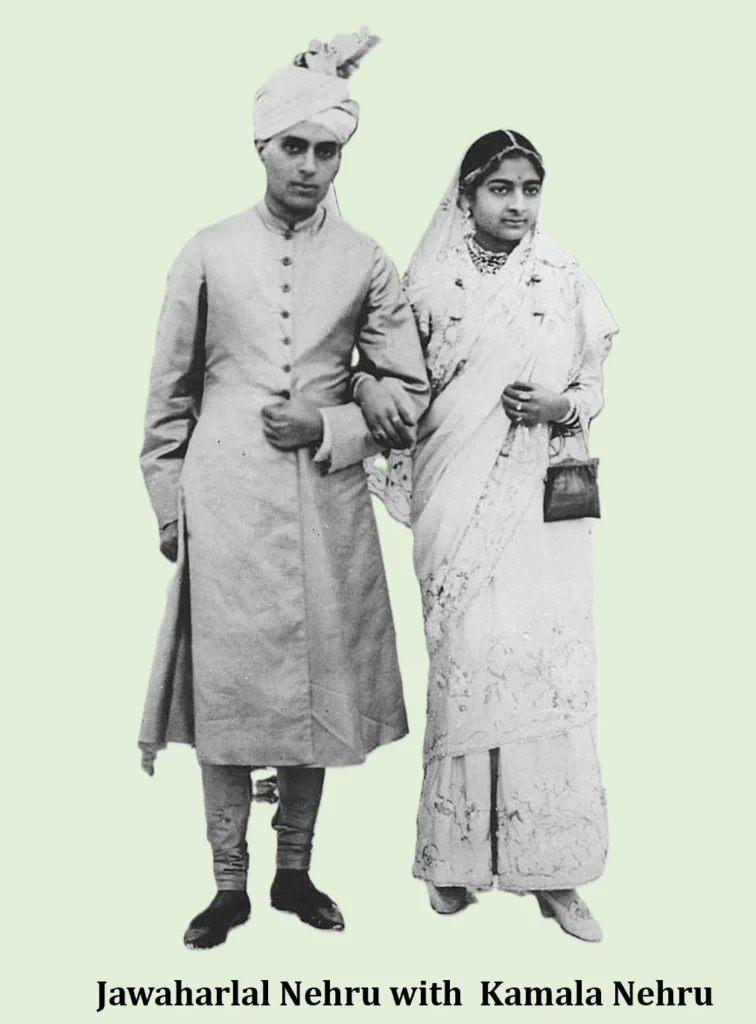
Supportive Partner
Jawaharlal Nehru was greatly influenced by Kamala Nehru. In spite of the expectations that were widely held, she participated enthusiastically in her husband’s pursuits. Kamala played a role in orchestrating social and political gatherings, especially those associated with the Indian National Congress and the fight, for independence.
Involvement in Social and Political Causes
Kamala Nehru was not merely a supportive wife but a political activist in her own right. She joined her husband in various public demonstrations, picketing, and marches during the Non-Cooperation Movement. Kamala was also involved in social work, particularly focused on women’s issues and education.
Challenges and Sacrifices
The family faced numerous challenges, particularly during periods of political upheaval and Jawaharlal’s incarcerations. Kamala Nehru endured the separation caused by her husband’s imprisonment, demonstrating resilience and commitment to the nationalist cause. Her involvement in political and social causes left an enduring impact on the Nehru-Gandhi family legacy. Her support for her husband’s vision and her independent contributions to the national movement set a precedent for the active role of women in India’s political sphere.
Although Jawaharlal Nehru was heavily involved in politics Kamala Nehru played a role in maintaining a balance, between their family life and the chaotic political scene of pre independence India. Their partnership demonstrated a dedication to India’s freedom and societal advancement which has had an influence on the Nehru Gandhi family’s political legacy, in India.
Nehru’s Political Journey and Influential Ideologies
After coming to India Nehru got actively engaged in the Indian National Congress, which was the political party that fought against British rule, for independence. He gained recognition for his speaking skills and forward thinking ideas making him a prominent figure in the movement, for Indian independence. Influenced by nationalist beliefs Nehru passionately advocated for an equal India.
Significance of Nehru’s Vision in Shaping a Nation
His vision for India extended far beyond mere independence. He had a vision, for a nation that placed importance on progress, fairness and democratic values. His ideas and actions laid the foundation for modern day India shaping its progress, social welfare efforts and international relations.
Jawaharlal Nehru’s Role in the Indian Freedom Struggle
Early Involvement and Political Awakening
His involvement, in the struggle for independence commenced at an age inspired by his family’s strong dedication to nationalist principles. By participating in discussions and engaging with figures he gained an understanding of the political situation. Knowing this information motivated him to join the struggle against dominance.
Leadership in the Non-Cooperation Movement
Nehru became a known figure, in the Non-Cooperation Movement (1920 1922) by supporting Mahatma Gandhis plea for resistance. His ability to inspire and mobilize individuals, including students was a factor, in his involvement, in politics.
Advocacy for Complete Independence
As the President of the Indian National Congress during the Lahore Session in 1929, Nehru played a pivotal role in shaping the Congress’s stance. The adoption of the “Purna Swaraj” resolution under his leadership marked a departure from earlier demands, boldly declaring the goal of complete independence for India.
Symbolic Acts and Civil Disobedience
Nehru’s dedication, to the fight for independence was demonstrated through gestures like raising the flag of the Indian National Congress on the shores of the Ravi River during the Lahore Session. This incident paved the path for the Civil Disobedience movement in 1930.
Imprisonment and Personal Sacrifices
His dedication to the freedom struggle led to multiple imprisonments by the British authorities. His willingness to endure personal sacrifices and face imprisonment endeared him to the masses, making him a symbol of the struggle for independence.
Key Role in the Quit India Movement
In the midst of the Quit India Movement, in 1942 Nehru emerged as a figure in championing the termination of British rule. The agitation demanding the British leave India immediately was fueled by his arrest as well as the detention of other leaders.
Architect of the Interim Government
His leadership went beyond protesting. In 1946 as the leader of the Interim Government he played a role, in engaging in negotiations with the British to ensure a transition to independence setting the foundation, for India’s rise as an independent nation.
First Prime Minister of Independent India
Jawaharlal Nehru played a role in the fight, for freedom and his efforts ultimately led to him becoming the Prime Minister of an independent India. His aspirations, for an inclusive and forward-thinking nation formed the bedrock of the country’s social structure.
Legacy and Impact on Modern India
His impact extends beyond the years of India’s fight for freedom. His contributions, to shaping the social landscape of India continue to shape the nations path making him a crucial figure in its history.
Jawaharlal Nehru as President of Indian National Congress
His leadership as the President of the Congress during the Lahore Session of 1929 showcased his dedication to complete independence and set the stage for advancements in the struggle against British rule. Guidelines for movements were defined by the resolution that was passed during this session. Had a significant impact, on shaping Indias path towards independence.
- Context of the Lahore Session: In 1929 during the Lahore Session Nehru took on the role of President of the Indian National Congress. This was a time, in the independence movement as the Congress was reassessing its strategy, towards British rule and aiming for a more assertive position.
- The Purna Swaraj Resolution: His most significant contribution during the Lahore Session was the introduction of the “Purna Swaraj” resolution, signaling a paradigm shift in the Congress’s objectives. This resolution boldly declared the goal of complete independence for India, moving beyond the earlier demands for dominion status or limited self-rule within the British Commonwealth.
- Symbolic Hoisting of the Tricolor: On the day of 1929 Nehru and fellow leaders, from the Congress party performed an act by hoisting the flag of the Indian National Congress on the shores of the Ravi River. This act represented not the unity of purpose among Congress leaders. Also set the foundation, for the future national flag of a free India.
- Ideological Vision of Nehru: His presidency at the Lahore Session reflected his evolving ideological stance within the Congress. His vision was characterized by a commitment to socialist principles, secularism, and a holistic approach to India’s socio-economic development. This vision played a pivotal role in shaping the Congress’s ideology during a critical phase of the freedom struggle.
- Link to the Civil Disobedience Movement: The Lahore Session was a precursor to the Civil Disobedience Movement that unfolded in 1930. His call for complete independence laid the ideological foundation for this mass movement, emphasizing nonviolent resistance as a means to achieve India’s freedom. The session marked a strategic shift towards more assertive and direct action against British colonial rule.
- International Dimension: During the Lahore Session Nehru acknowledged the significance of Indias fight for independence. He articulated the importance of India’s freedom in the broader context of global peace and justice. His vision, for India was shaped by his belief in its role, as an influential member of the community. This international perspective played a part in his outlook.
- Lasting Impact on the Independence Movement: The Lahore Session, under his leadership, had a profound and lasting impact on the trajectory of the Indian independence movement. The Purna Swaraj resolution became a rallying point for subsequent movements, inspiring activists and leaders across the country. His presidency marked a period that propelled the movement towards attaining independence to heights.
His position as the President of the Congress during the Lahore Session in 1929 marked a turning point in India’s fight for freedom. His visionary guidance, combined with the adoption of the Purna Swaraj resolution influenced the Congress’s position. Established a strong foundation for notable advancements in their battle, against British colonial rule.
Jawaharlal Nehru’s Relationships with Prominent Leaders
Mahatma Gandhi: The Mentor and Guide
The bond, between Nehru and Mahatma Gandhi was a partnership that had an impact on the direction of the Indian independence movement. Nehru, who was deeply influenced by Gandhi’s dedication to nonviolence sought guidance and inspiration from him. This connection began while Nehru was studying in England, where he deeply absorbed Gandhis philosophy. Their collaboration reached its peak during the Non-Cooperation Movement and the Civil Disobedience Movement, where Nehru emerged as a leader, under Gandhis mentorship. Despite occasional differences in ideology, especially regarding economic models, Nehru remained a steadfast supporter of Gandhi’s commitment to nonviolent resistance.
The Quit India Movement in 1942 further solidified their unity as both leaders were arrested by the British authorities. After gaining independence Nehru maintained a connection, with Gandhi seeking his advice and being greatly influenced by his beliefs in social justice, secularism and nonviolence. This influence is clearly seen in his approach, to governance, where he emphasized coexistence, diplomatic resolutions and the inclusive vision of an India. The impact of their collaboration continues to shape the essence of contemporary India.
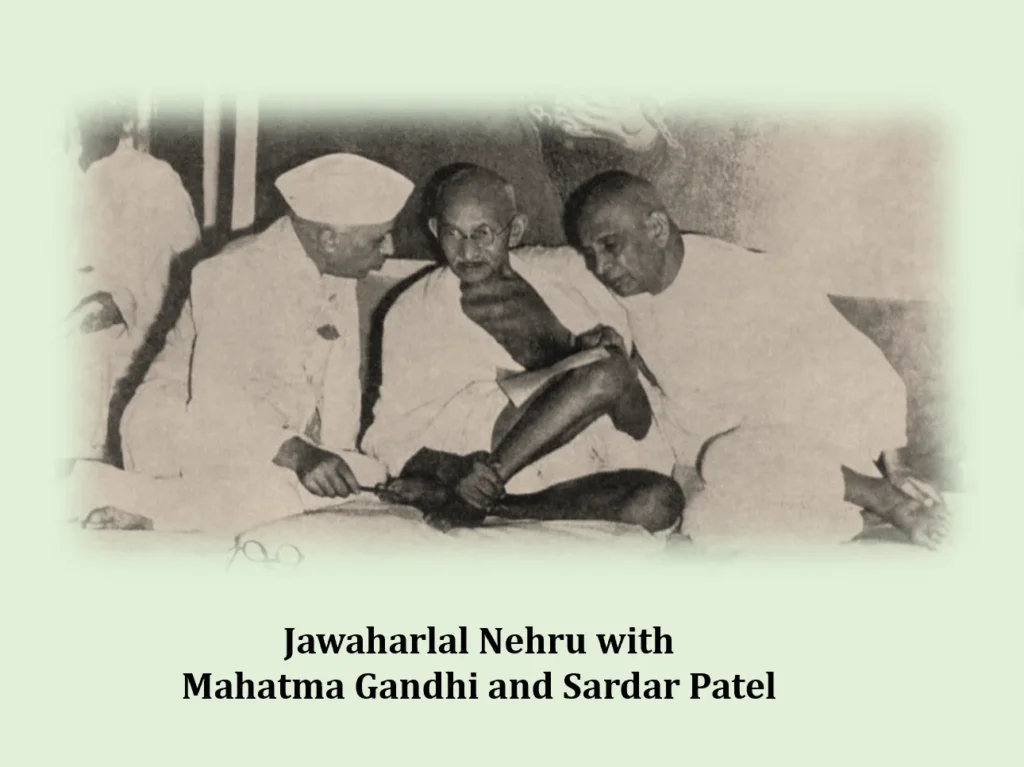
Sardar Patel: Complementary Partners in Nation Building
Jawaharlal Nehru and Sardar Patel both figures, in the independence movement had a unique and complementary partnership. Although they held views with Nehru favoring socialism and Patel being more practical their collaboration played a vital role, in shaping India after gaining independence. Patel, known for his organizational skills and decisive approach, played a pivotal role in the integration of princely states into the Indian Union.
Nehru, as the Prime Minister, focused on his vision of a democratic and secular nation. Despite occasional tensions and differing priorities, especially during the integration process, their collaboration ensured the unity and territorial integrity of India. They worked together to establish a unified country overcoming the obstacles of building a nation during the years of independence. The collaboration, between Nehru and Patel demonstrated their skill in bringing viewpoints for the benefit of the recently liberated nation.
Subhas Chandra Bose: The Ideological Divergence
The association, between Jawaharlal Nehru and Subhas Chandra Bose, who were figures in India’s struggle for independence can be described as a mix of cooperation and differences, in ideology. These two leaders were united in their determination to liberate India from rule and worked together within the Indian National Congress during the period spanning the 1920s to early 1930s. However, their journeys took directions when Bose, feeling disappointed by the Congress’s approach decided to pursue a more assertive and aggressive strategy. This led to the establishment of the Forward Bloc in 1939.

Over time the ideological contrasts, between Nehru and Bose grew more apparent. Nehru was dedicated to socialism and nonviolence while Bose took a radical and militant approach. The strain in their relationship intensified when Bose made an escape, from house arrest during World War II and sought aid all while Nehru was heading the interim government.
While both leaders shared the goal of Indian independence, their differing approaches and geopolitical circumstances of the era created a nuanced and sometimes contentious relationship. The legacy of his association with Subhas Chandra Bose reflects the complexities and varied ideologies within the broader spectrum of the Indian independence movement.
B.R. Ambedkar: Collaboration in Constitutional Framing
Jawaharlal Nehru and B.R. Ambedkar, who played a role, in drafting the Indian Constitution and advocating for justice shared a collaborative relationship focused on creating an inclusive and democratic India after independence. During the Constitutions formation Nehru and Ambedkar closely collaborated to ensure that it embodied principles of equality and justice. Despite their differing ideologies. With Nehru inclined towards socialism and Ambedkar emphasizing the protection of marginalized communities rights.
Their partnership was instrumental in shaping the framework. As the chairman of the Drafting Committee Ambedkar played a role in securing provisions for action and safeguarding Dalit rights. Nehru, as India’s Prime Minister consistently sought Ambedkar’s guidance and supported policies aimed at achieving economic justice. Together their early collaboration laid a foundation for addressing caste-based discrimination issues and promoting inclusivity and diversity leaving an enduring impact on the nation’s commitment, to these values.
Muhammad Ali Jinnah: Collaborator Turned Adversary
The relationship, between Jawaharlal Nehru and Muhammad Ali Jinnah, the founder of Pakistan was characterized by disagreements and the eventual division of British India. Although they initially worked together in the Indian National Congress with shared objectives their visions for independence India gradually diverged. Jinnah as the representative of the Muslim League promoted the idea of a nation for Muslims, which ultimately led to the formation of Pakistan in 1947. The two leaders held contrasting views on the role of religion in governance as Nehru advocated for a state. The partition resulted in violence and large scale migrations leaving a lasting impact, on the subcontinent.
While Nehru and Jinnah had engaged in negotiations and discussions during the pre-independence period, their relationship became strained as the demand for a separate Muslim state intensified. The partition marked the culmination of these differences, shaping the destinies of India and Pakistan as independent nations. The complexities of their relationship and the events surrounding partition continue to be a significant aspect of the history of South Asia.
Rajendra Prasad: Collaborator in Constitutional Governance
Jawaharlal Nehru and Rajendra Prasad the President of India had a relationship based on respect and collaboration during the early years of our independent nation. As the Prime Minister Nehru worked alongside Prasad, who served as President to overcome the challenges of governance and establish a foundation, for rule. Despite their roles his vision of a socialist India resonated with Prasad’s dedication to constitutional principles. The collaboration, between individuals was especially noticeable during the creation of the Indian Constitution, with Prasad serving as the President of the Constituent Assembly.
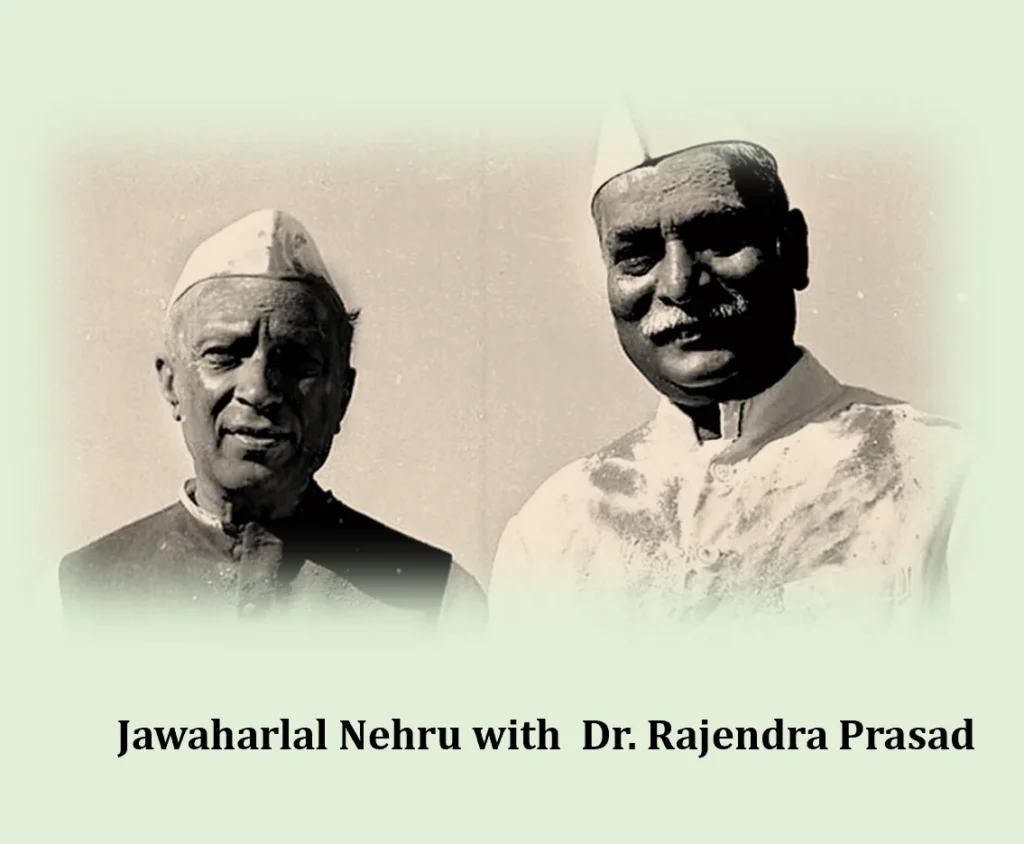
Nehru highly valued Prasad’s statesmanship while Prasad appreciated his leadership in those years of nation building. Together, they represented how the executive branch and the head of state cooperated in our republic. Their collaboration made a substantial contribution to maintaining India’s stability and promoting its principles.
C. Rajagopalachari: Differences in Economic Philosophy
Jawaharlal Nehru and C. Rajagopalachari had contrasting views, on philosophy and political strategies. As the Prime Minister Nehru supported a model that focused on government led planning and growth. In contrast, Rajagopalachari leaned towards free-market principles and limited government intervention. Their ideological divergence became particularly evident during discussions on economic policies, with Rajagopalachari criticizing aspects of his economic planning. Despite these differences, both leaders shared a commitment to the principles of democracy and secularism.
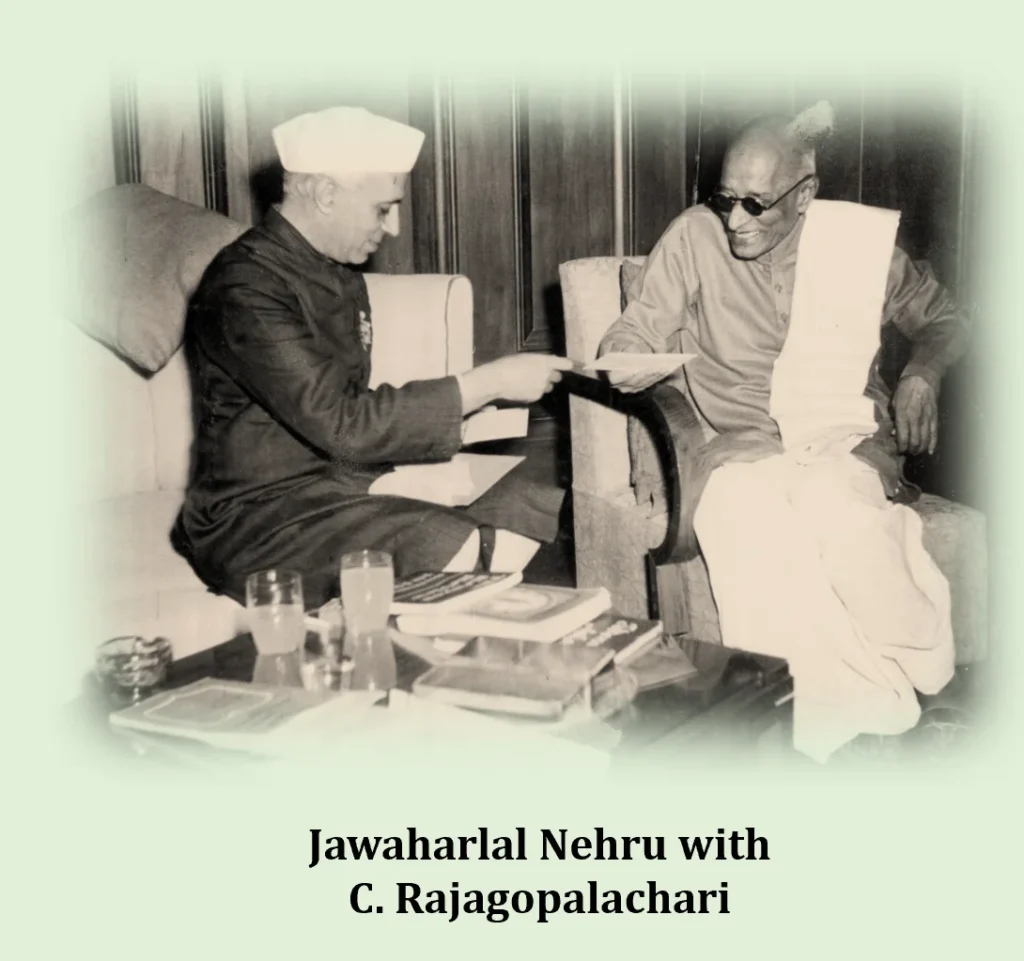
Rajagopalachari, known for his intellectual prowess and independence, contributed to debates within the Indian National Congress. While their perspectives on economic matters sometimes led to tensions, Nehru and Rajagopalachari maintained a level of mutual respect, acknowledging the importance of diverse opinions within the political discourse of post-independence India. The bond they shared exemplifies the challenges of governing a nation during a phase of development.
Nehru an Idol Father to Indira Gandhi
Jawaharlal Nehru, beyond his towering presence as the first Prime Minister of India, was an idolized father to his only daughter, Indira Gandhi. His influence on Indira extended beyond the political realm, shaping her values, principles, and leadership style.
After the passing of his wife, Kamala Nehru in 1936 Nehru assumed the role of a parent. Took on the task of raising Indira. He not provided for her. Also served as a mentor nurturing in Indira a love, for learning, an inquisitive mind and a strong dedication, to serving the nation. Indira’s political philosophy was significantly impacted by his progressive vision for India, which placed a strong emphasis on democracy and secularism.
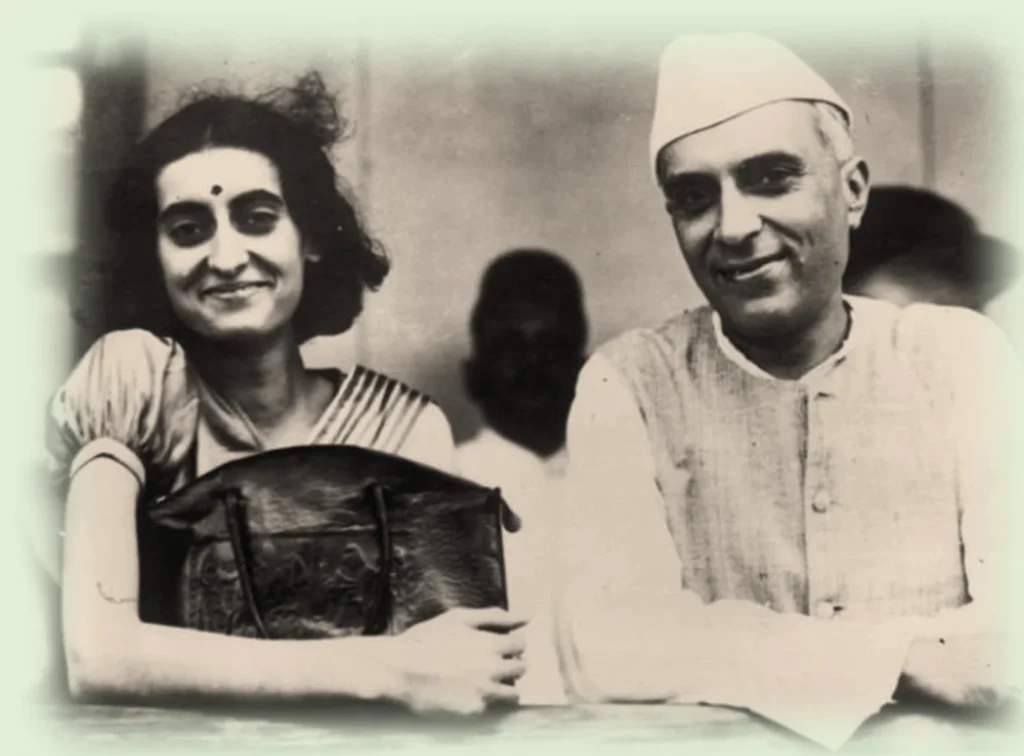
His support and mentorship were crucial, in her journey in politics leading to Indira Gandhis achievement as the female Prime Minister of India. A nation’s future can be significantly shaped by a father’s leadership, as seen by Indira’s steadfast devotion to his principles and the survival of the Nehru Gandhi dynasty. Nehru was a revered father figure to Indira.
Nehru’s Foundational Policies for Development
His economic, social, and foreign policies were key pillars in his vision for India’s development. Each of these policies played a crucial role in nation-building and provided a framework for India’s progress.
Nehru Seeds of Meritocracy
His foresight in establishing premier institutions like IITs, AIIMS, IIMs, ISRO, and others has propelled India to global acclaim. These institutions became catalysts for technological advancements, medical breakthroughs, and cutting-edge research, positioning India just behind global giants like the USA and China.
Nehru’s Economic Policy: The Five-year plan
Jawaharlal Nehru had an impact, on India’s strategies and his influence can be clearly seen in the introduction and execution of the Five-Year Plans. These plans, which took inspiration from models aimed to attain self-reliance and rounded growth across different sectors of the economy. His determination and vision to propel India towards industrialization played a role, in the formulation of these strategies.
Architect of Economic Vision
- Adoption of Planned Economy: His fascination with socialist ideals, drawn from his interactions with leaders like Fabian socialists in Britain and the Soviet model, influenced his decision to adopt a planned economy. This shift, in India’s philosophy marked a departure from the hands-off approach.
- Industrialization Focus: Nehru placed importance on industrialization as a means to achieve growth and self-sufficiency. Hence the Five-Year Plans gave priority to developing industries, particularly those in the public sector.
Implementation of Five-Year Plans
- Under his leadership the first plan (1951 1956) focused on agriculture, irrigation and power generation. The aim was to lay the foundation, for progress while also addressing socio economic challenges.
- Second Five-Year Plan (1956-1961): Building on the first plan’s achievements, the second plan intensified efforts in industrialization, particularly heavy industries. Nehru sought to reduce regional disparities and improve social welfare, including education and healthcare.
- Continued Commitment: Nehru remained committed to the planning process, providing strong leadership during the subsequent plans. His vision was to create a self-sufficient and socially equitable nation through planned economic development.
Challenges and Adjustments
- External Challenges: His economic vision faced challenges, including the Indo-China war and the economic blockade during the early 1960s. These external factors necessitated adjustments in the plans to address immediate concerns.
- Focus on Agriculture: Recognizing the significance of agriculture, Nehru directed attention to the sector in later plans, emphasizing self-sufficiency in food production.
Legacy of the Plan
- Foundation for Future Policies: His Five-Year Plans laid the foundation for India’s economic policies, influencing subsequent leaders. The emphasis on state-led planning persisted, evolving over time to adapt to changing global economic dynamics.
- Mixed Legacy: While the plans contributed to significant industrialization and infrastructure development, their mixed success also led to debates on the effectiveness of centralized planning.
His contribution, to the Five-Year Plans highlights his aspiration for an industrially progressive India. Despite facing obstacles and receiving criticisms his dedication to growth influenced the direction of India’s economic strategies and had a long-lasting effect, on the country’s pursuit of self-reliance.
Nehru’s Laying the Foundation for Growth
Nehru, with the aim of rejuvenating a nation that had suffered from exploitation implemented strategies that introduced public sector companies, constructed dams and established financial institutions such, as RBI, SBI and LIC. Despite challenges, these initiatives form the backbone of India’s economic prowess today.
- Emphasis on Industrialization and Modernization: As mentioned above Nehru recognized the importance of industrialization in lifting a nation out of poverty and backwardness. Through the implementation of the first and second five-year plans, his economic initiatives were primarily focused on achieving self-reliance and fostering expansion. With a focus on heavy industries like steel, coal, and equipment, India built a strong industrial basis under his leadership.
- Land Reforms and Agricultural Development: Nehru understood the significance of agriculture in India’s economy. He implemented land reforms to address the issues of landlordism and ensure fair distribution of land to farmers. Furthermore, Nehru made investments, in irrigation initiatives implementing farming methods and enhancing infrastructure development as means to enhance agricultural productivity and uplift rural communities.
- Initiatives in Education and Human Capital Development: Nehru held the belief that education and the development of capital were crucial, for Indias advancement. He took the lead in implementing reforms, with the goal of eliminating illiteracy fostering scientific education and empowering the younger generation. His commitment to education laid the groundwork for India’s renowned educational institutions and a skilled workforce.
Nehru’s Social Policies: Ensuring Equality and Progress
Focus on Social Justice and Programs
Nehru had a dedication, to promoting justice and implementing welfare programs that aimed to uplift marginalized communities. He came up with strategies to address issues concerning poverty, inequity and prejudice. By introducing initiatives such, as the Five-Year Plans, rural development programs and poverty alleviation schemes Nehru strived to build a society that was fairer and more inclusive.
His Commitment to Women Empowerment
Nehru strongly advocated for the rights and empowerment of women. He recognized the contributions made by women, in nation building. Actively strived for gender equality. Nehru endorsed initiatives, including promoting women’s education encouraging their representation and advocating for legal reforms to empower women socially and economically.
Promoting Secularism and Unity in Diversity
Nehru firmly believed in the principles of secularism and unity in diversity. He advocated for a society where individuals of religions, cultures and backgrounds could peacefully coexist. His inclusive approach, to governance and his efforts to safeguard the rights of minorities played a part in strengthening the social fabric of India.
His Foreign Policies: Striving for non-leadership
Non-Aligned Movement: Paving the Way for Global Diplomacy
Nehru played a role in leading the Non Aligned Movement, which aimed to maintain independence from the powers involved in the Cold War while promoting peace and cooperation. Through his initiatives Nehru sought to position India as a leading nation among countries by advocating for decolonization and supporting emerging nations aspirations, for self-determination.
Nehru’s Stance on Decolonization and Independence Movements
Nehru, being a leader, in the independence movement had an understanding of the struggles faced by nations under colonization. He provided assistance. Actively participated in endeavors to aid independence movements in Africa, Asia and the Middle East. His support for independence had a big impact on how the world order evolved to be.
Promoting Peace and International Cooperation
Nehru strongly advocated for peace and actively worked towards fostering relations, with countries. Nehru was instrumental, in the establishment of the United Nations working tirelessly to advocate for resolutions to conflicts. His unwavering dedication to non-violence and diplomacy positioned India as an advocate, for peace.
Nehru’s Role in Democratic Institution Building
During India’s shift from being, under rule, to becoming a democratic country Nehru played a crucial part in laying the groundwork for a contemporary democratic system.
Architect of India’s Constitution: Ensuring Democratic Foundations
Nehru’s Contributions to the Drafting Process
Nehru played a role, in the creation and development of India’s constitution. As the leader of the drafting committee of the Constituent Assembly Nehru dedicated himself to ensuring that the constitution embodied values, equality and secularism.
Upholding Basic Rights and Freedoms
Nehru stressed the significance of protecting the rights and liberties of individuals. He advocated for measures that ensured the freedom to express oneself practice religion and form associations thereby guaranteeing rights and opportunities, for all citizens.
Establishing Strong Institutions for Effective Governance
Nehru recognized the importance of strong institutions in maintaining a functioning democracy. In order to maintain efficient government and preserve democratic values, he strove to build strong, independent institutions, such as the court, bureaucracy, and election systems.
Fostering Unity in Diversity: Nehru’s Approach to Pluralism
Promoting Linguistic and Cultural Unity
India’s vast diversity posed a significant challenge to national integration. Nehru worked towards promoting linguistic and cultural unity by recognizing and respecting the diverse identities within the country. He advocated for the adoption of a federal structure that allowed states to have their own languages and cultural autonomy while remaining united.
Nehru’s Pivotal Role in the Integration of Princely States
During the period of India’s independence there were a number of states that maintained their independence. Nehru played a role, in bringing these states and integrating them into the Indian Union safeguarding the unity and boundaries of our nation. His ability to negotiate effectively and diplomatically was crucial in securing India’s statehood.
Strengthening Federalism and Center-State Relations
Nehru had a perspective, on federalism that emphasized the importance of a government while also giving considerable authority to the states. His vision involved a structure where both the central and state governments would collaborate to meet the requirements and aspirations of the people. Nehru’s emphasis on center-state relations helped strengthen the foundations of Indian federalism.
Upholding Democratic Values: Nehru’s Commitment to Free Speech
Nehru’s Commitment for Press Freedom and Freedom of Expression
Nehru strongly believed in the significance of a press as an element of democracy. He actively supported freedom of expression allowing individuals to express their opinions and engage in criticism without any fear of persecution. Nehru understood that a healthy, independent media was essential to preserving democracy.
Controversial Decisions and Nehru’s Defense of Democratic Values
During his tenure as Prime Minister of India J.L Nehru faced numerous challenges. Made decisions that sparked controversy. However he consistently defended his actions within the framework of democracy and the rule of law. His unwavering commitment, to values ensured that decisions were made transparently and with accountability.
Balancing Democratic Principles with National Security Concerns
Nehru skillfully managed to strike a balance between concerns for national security and democratic ideals. In the face of internal and external threats, Nehru took measures to safeguard the nation while upholding democratic values. His ability to strike this balance contributed to India’s stability and national security.
Nehru’s Legacy and Impact on Modern India
His legacy and impact on modern India are far-reaching. His policies and leadership continue to shape India’s economic, social, and foreign policies.
Nehruvian Socialism: Evaluating Successes and Shortcomings
Tenets of Nehruvian Socialism and their Implementation
Nehruvian socialism aimed to establish an economy that balanced state control and private enterprise. Although this model achieved welfare and economic growth to some extent it also faced challenges such, as inefficiencies and slow-paced reforms.
Assessing the Impact on India’s Economic Development
There have been discussions on the effects of his policies on India’s development. While these policies laid the groundwork for industrialization and self-sufficiency critics argue that they hindered growth and innovation with their approach.
Legacy and Relevance in the 21st Century
Nehruvian socialism still influences policy debates in contemporary India. Although market-oriented reforms have been embraced there is still a need for social welfare programs and inclusive growth. We are reminded by his legacy of the importance of finding a balance between social welfare and growth.
Nehru’s Influence on India’s Foreign Policy
Continuity and Transformation of Nehru’s Non-Aligned Approach
His non-aligned foreign policy approach aimed to maintain India’s independence from the Cold War superpowers. While India’s foreign policy has evolved over the years, elements of his non-alignment principles can still be seen in India’s diplomatic engagements, particularly in maintaining strategic autonomy and fostering multi-polarity.
Assessing the Legacy of Nehru’s Global Diplomacy
His vision for global peace and cooperation continues to shape India’s foreign policy. India’s strong emphasis on multilateralism, diplomatic engagements, and peacekeeping missions reflect his commitment to promoting global harmony.
India’s Position in the Modern World: From Nehru to Present Day
India has emerged as a significant player on the global stage, with its influence and impact expanding since his era. In the century India encounters challenges that differ from those experienced during his era. However, the guiding principles of coexistence, respect, for sovereignty and cooperation laid down by Nehru still serve as the basis for India’s interactions, with the community.
Evaluating Nehru’s Leadership: Lessons for Future Generations
An evaluation of Nehru’s leadership qualities
Nehru as a powerful leader had the ability to motivate and rally people, he was intellectually sharp. He held firm to principles. However like any leader he also had some weaknesses. Some saw him as having tendencies. He faced difficulties, in effectively governing.
Impact of Nehru’s Leadership Style on Indian Politics
His way of leading and his political beliefs still have an influence, on politics. His focus, on secularism, democracy and social justice continues to be an aspect of India’s discussions. The effects of his leadership can be observed in the ideologies and policies of generations of leaders.
Lessons for Contemporary Leaders and Policymakers
Contemporary leaders and policymakers can draw valuable lessons from his leadership. Jawaharlal his dedication, to democracy, social justice and inclusive progress provides a guide for tackling the challenges of today’s world. His legacy emphasizes the significance of having leaders who feel a sense of responsibility towards their nation.
Jawaharlal Nehru: A Remarkable Writer
from being a political figure Jawaharlal Nehru was also an incredibly prolific writer. His literary works span subjects such as history, politics, philosophy and the socio-economic development of India. Let me provide you with an overview of some books penned by Jawaharlal Nehru.
Letters from a Father, to His Daughter (1929)
Jawaharlal Nehru sought to familiarize his ten-year-old daughter, Indira, with the geography, history, and culture of India through this series of letters. What makes these letters unique is his ability to transform narratives into captivating stories that resonate with young readers.
This book’s letters provide readers with a window into several historical eras, covering topics ranging from the Mughal Empire to the Indus Valley Civilization. His writing style seamlessly combines simplicity and profound insights making the book not informative but enjoyable for readers of all ages. He narrates a tale through these letters that bolsters our sense of national pride and broadens our awareness of India’s past.
Moreover, this book reflects his dedication to education and his desire to cultivate a love for learning in his daughter. “Letters from a Father to His Daughter” has transcended its role as a tool for Indira; it has become a timeless work that continues to serve as an accessible introduction to India’s cultural and historical tapestry. It allows readers to embark on a captivating journey through centuries past.
Glimpses of World History (1934)
Another noteworthy work by Nehru is “Glimpses of World History” (1934). Originally composed as letters during his time in prison these pages offer an exploration of world events and influential figures. From civilizations to times Nehru skillfully weaves together a vibrant tapestry of historical moments.
The book serves as a knowledge bridge, offering readers insightful looks into many eras, societies, and civilizations. His unique approach transforms complex historical narratives into captivating stories, making the subject matter accessible to readers of varying ages and backgrounds. His commentary reflects a blend of historical analysis and personal reflections, showcasing his deep understanding of global affairs.
Beyond its educational value, “Glimpses of World History” has enduring appeal due to his ability to distill complex information into digestible narratives. The book’s relevance extends beyond its original context, making it a timeless work that continues to be appreciated for its contribution to historical understanding. His commitment to providing his daughter with a broader worldview through these letters has left an indelible mark on the literary landscape, creating a resource that invites readers to explore the complexities of human history.
An Autobiography (1936)
“An Autobiography,” published in 1936 offers a captivating narrative of his years his intellectual growth and his involvement, in India’s fight, for freedom. While not a conventional autobiography, his narrative is a personal reflection on his experiences, ideologies, and the historical forces that shaped him. The book traces his childhood, education in England, exposure to political ideologies, and his eventual immersion in the Indian Nationalist Movement.
His writing style is contemplative and self-reflective giving readers a glimpse, into his growth and the influences that shaped his awareness. He shares his experiences with Mahatma Gandhi, his involvement in the Non-Cooperation Movement and the obstacles confronted by the Indian National Congress during moments of the freedom struggle.
The autobiography serves as evidence of his dedication to equality, secularism and democratic values. It gives a history of the years leading up to India’s independence and sheds light on his goals for a contemporary, progressive, and inclusive country. “An Autobiography” remains a document and a must read for those seeking to comprehend the thoughts and motivations of one of India’s eminent leaders.
Toward Freedom (1936)
Jawaharlal Nehru and his assistant Krishna Hutheesing attempted to tell the story of his political journey and India’s struggle for independence in “Toward Freedom” (1936). The book covers his life, education well as his active participation in the Indian Nationalist Movement. It explores events like the creation of the Non Cooperation Movement and the Indian National Congress, among others, offering insightful information about the difficulties leaders faced in their fight against British colonial control.
His book “Toward Freedom” showcases his unwavering dedication to India’s independence and his aspirations, for a nation that upholds democracy and secularism. The book beautifully captures the spirit of that time depicting the passion and sacrifices made by those involved in the struggle, for freedom. It serves as a record shedding light on the political climate, alliances and ideological shifts within the Indian National Congress.
While “Toward Freedom” is a resource for understanding his influence in shaping India’s future it also contributes to a comprehension of the collective efforts that led to India’s eventual independence. The book remains relevant for scholars, historians and readers in exploring the intricacies of India’s fight for freedom during the half of the 20th century.
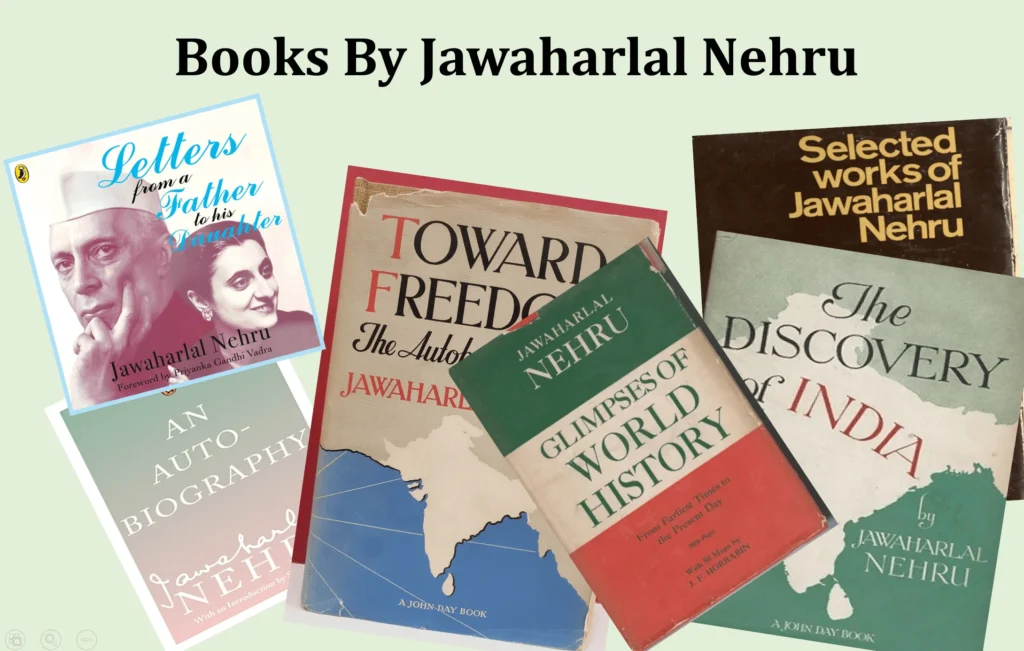
The Discovery of India (1946)
“The Discovery of India” is Jawaharlal Nehru’s work that reflects his understanding and contemplation of India’s rich history, culture and philosophy. Penned during his time in prison from 1942 to 1946 this masterpiece offers a view of India’s past encompassing civilizations, medieval periods and the struggle, for independence.
His narrative goes beyond an account, it embarks on an intellectual journey to uncover the essence of India’s identity. From the Indus Valley Civilization to the impact of foreign invasions, the book meticulously traces the evolution of Indian society. Nehru not only presents historical events but also captures the spirit of India’s philosophical and cultural heritage.
The book is characterized by his reflective and analytical approach, offering readers a nuanced understanding of the complexities inherent in India’s historical tapestry. His exploration of diverse aspects, including the Vedas, the Upanishads, and the impact of colonialism, showcases a deep commitment to India’s pluralistic ethos.
As evidence of Nehru’s intellectual prowess, “The Discovery of India” takes readers on an engrossing and perceptive voyage through the passages of time, finally advancing understanding of India’s complex identity and lasting significance.
Selected Works of Jawaharlal Nehru (1972-1979)
“The Selected Works of Jawaharlal Nehru ” published between 1972 and 1979 is a collection of Jawaharlal Nehru’s writings, speeches and letters that offers insights, into his thoughts and perspectives. Published in volumes from 1972, to 1979 this collection is a resource for scholars, historians and individuals eager to explore Nehru’s intellectual heritage and his impact, on India’s path after gaining independence.
The collection of writings encompasses a range of topics including politics, economics, international relations and social matters. Nehru’s spoken speeches, writings and well crafted letters are meticulously recorded, showcasing his dedication to democratic principles, secularism and fairness.
The compilation covers phases in history, like the fight, for independence the hurdles of establishing a nation and the initial years of governance after gaining independence. These volumes clearly depict Nehru’s encounters with other world leaders as well as his vision of a modern, progressive India.
The collection titled “Selected Works” provides readers with an insight, into his philosophy of governance his dedication to constructing a diverse nation and his endeavors in maneuvering through the intricacies of the post-colonial period. It serves as an asset for individuals who wish to gain a profound understanding of Nehru’s multifaceted impact, on India’s political, social and economic fabric.
His writings do not serve as a record of India’s path, to independence but also showcase his vision for the country and his involvement, in global matters. His literary heritage holds significance in India’s cultural legacy offering readers valuable glimpses into the thoughts of a leader who played a vital role in shaping the nation’s future.
Summary and FAQs
Nehru has made a lasting impact, on India with his thinking leadership and dedication to the country’s progress. His strategies for growth and investment in resources have provided a strong base, for the development of industries. Nehru’s social policies focused on equality, women empowerment, and secularism. His foreign policies paved the way for non-aligned leadership and global diplomacy. Nehru played a central role in democratic institution building, fostering unity in diversity and upholding democratic values. His legacy continues to shape India’s economic policies, foreign relations, and political discourse.
What were the key challenges Nehru faced in shaping India?
Nehru faced numerous challenges in shaping India, including the aftermath of colonial rule, the partition of India and Pakistan, economic disparities, and the integration of princely states. Nehru also had to balance diverse religious, linguistic, and cultural identities while forging a united nation.
How did Nehru contribute to women empowerment?
Nehru strongly believed in promoting women’s rights and empowering them. He actively backed causes, like women’s education, their representation in politics and the need, for reforms to support them. Nehru understood that the advancement and development of the country depended heavily on the empowerment of women.
What is the relevance of Nehru’s legacy in modern India?
In contemporary India, Nehru’s legacy is extremely important. He always emphasized on inclusive progress, secularism, and values continues to influence India’s national-building projects and policies. The ideals that Nehru espoused—unity in diversity, social justice, and non-alignment—remain essential to the Indian identity on the international scene.
